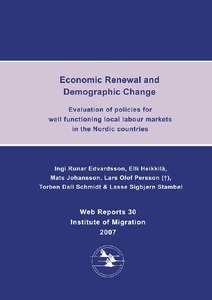Economic Renewal and Demographic Change : an Evaluation of Policies for Functioning Local Labour Markets in the Nordic Countries
Edvardsson, Ingi Runar; Heikkilä, Elli; Johansson, Mats; Persson, Lars Olof; Schmidt, Torben Dall; Stambøl, Lasse Sigbjørn (2007)
Edvardsson, Ingi Runar
Heikkilä, Elli
Johansson, Mats
Persson, Lars Olof
Schmidt, Torben Dall
Stambøl, Lasse Sigbjørn
Siirtolaisuusinstituutti
2007
Julkaisun pysyvä osoite on
https://urn.fi/URN:NBN:fi-fe20201215100723
https://urn.fi/URN:NBN:fi-fe20201215100723
Kuvaus
Introduction
Emerging Challenges to Labour Market Efficiency
Purpose of the Paper
Northern Landscapes of Demographic Change
A Typology with Regard to Natural Population Change and Migration
Country Differences
Explanatory Components
Modes of Renewal of Local Economies and Labour Markets
A Career Approach
Nordic Employment Policy
Performance of Nordic Labour Markets
Local Labour Market Performance
Policy Implication
Conclusion
References.
Emerging Challenges to Labour Market Efficiency
Purpose of the Paper
Northern Landscapes of Demographic Change
A Typology with Regard to Natural Population Change and Migration
Country Differences
Explanatory Components
Modes of Renewal of Local Economies and Labour Markets
A Career Approach
Nordic Employment Policy
Performance of Nordic Labour Markets
Local Labour Market Performance
Policy Implication
Conclusion
References.
Tiivistelmä
Although unemployment is a persistent problem in several countries, the issue of labour shortages is now emerging as an increasingly stubborn obstacle to growth across Europe. The concurrence of relatively high levels of unemployment and labour shortages essentially reflects the highly differentiated nature of the labour market and the lack of coherence between the growth of demand for labour and the skills on offer among those looking for work. Recruitment difficulties tend to be reported in particular sectors even in periods of recession. In periods of recovery and as unemployment falls – or, more accurately, as the excess supply of labour diminishes – it is to be expected that skill bottlenecks will become more serious, the more so, naturally, in regions where unemployment is relatively low, but also in other areas where the skills of the unemployed do not match the demands of employers. If economic growth at present rates is sustained over the longer term, the problem of this “skills imbalance” is expected to be compounded by the projected slowdown in labour force growth over the next 10-15 years. In some regions we have already seen a decline.
EU countries differ considerably in terms of their internal labour market structures and economic performance. Well functioning labour markets are those which secure high labour force participation for all groups on the labour market, where transition from unemployment, sickness or education to work is relatively easy, and opportunities to lifelong learning are present. Labour market performance has been closely related to labour market and welfare policies. In this paper have chosen to analyse national policies on welfare and labour markets.
EU countries differ considerably in terms of their internal labour market structures and economic performance. Well functioning labour markets are those which secure high labour force participation for all groups on the labour market, where transition from unemployment, sickness or education to work is relatively easy, and opportunities to lifelong learning are present. Labour market performance has been closely related to labour market and welfare policies. In this paper have chosen to analyse national policies on welfare and labour markets.
